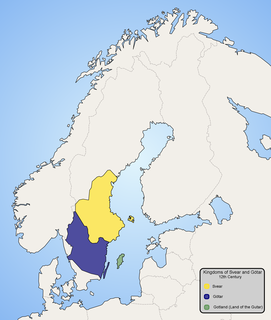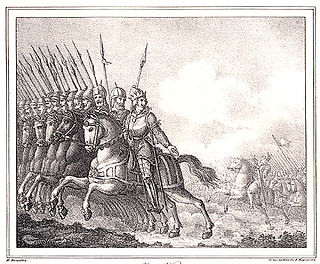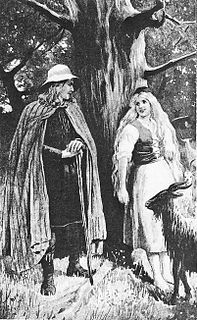
The Geats, sometimes called Goths, were a North Germanic tribe who inhabited Götaland in modern southern Sweden during the Middle Ages. They are one of the progenitor groups of modern Swedes, along with Swedes and Gutes. The name of the Geats also lives on in the Swedish provinces of Västergötland and Östergötland, the Western and Eastern lands of the Geats, and in many other toponyms.

Hrólfr Kraki, Hroðulf, Rolfo, Roluo, Rolf Krage was a semi-legendary Danish king who appears in both Anglo-Saxon and Scandinavian tradition.

Hrothgar was a semi-legendary Danish king living around the early sixth century CE.
Fróði is the name of a number of legendary Danish kings in various texts including Beowulf, Snorri Sturluson's Prose Edda and his Ynglinga saga, Saxo Grammaticus' Gesta Danorum, and the Grottasöngr. A Danish king by this name also appears as a minor character in the Middle High German epic Rabenschlacht. The name is possibly an eponym for the god Freyr.
Bödvar Bjarki, meaning 'Warlike Little-Bear', is the hero appearing in tales of Hrólf Kraki in the Saga of Hrólf Kraki, in the Latin epitome to the lost Skjöldunga saga, and as Biarco in Saxo Grammaticus' Gesta Danorum.

Eadgils, Adils, Aðils, Adillus, Aðísl at Uppsölum, Athisl, Athislus or Adhel was a semi-legendary king of Sweden, who is estimated to have lived during the 6th century.

Yrsa, Yrse, Yrs or Urse was a tragic heroine of early Scandinavian literature.
Onela was according to Beowulf a Swedish king, the son of Ongentheow and the brother of Ohthere. He usurped the Swedish throne, but was killed by his nephew Eadgils, who won by hiring foreign assistance.
Old English Scylding and Old Norse Skjöldung, meaning in both languages "People of Scyld/Skjöld" are the members of a legendary royal family of Danes, especially kings. The name is explained in many texts, such as Friedrich Christoph Dahlmann's 'Research on the Field of History', by the descent of this family from an eponymous king Scyld, but the title is sometimes applied to rulers who purportedly reigned before him, and the supposed king may be an invention to explain the name. There was once a Norse saga on the dynasty, the Skjöldunga saga, but it survives only in a Latin summary by Arngrímur Jónsson.

Halfdan was a late 5th and early 6th century legendary Danish king of the Scylding (Skjöldung) lineage, the son of king named Fróði in many accounts, noted mainly as the father to the two kings who succeeded him in the rule of Denmark, kings named Hroðgar and Halga in the Old English poem Beowulf and named Hróar and Helgi in Old Norse accounts.

Halga, Helgi, Helghe or Helgo was a legendary Danish king living in the early 6th century. His name would in his own language (Proto-Norse) have been *Hailaga.

Geatish kings, ruling over the provinces of Götaland (Gautland/Geatland), appear in several sources for early Swedish history. Today, most of them are not considered historical.

Helgi Hundingsbane is a hero in Norse sagas. Helgi appears in Volsunga saga and in two lays in the Poetic Edda named Helgakviða Hundingsbana I and Helgakviða Hundingsbana II. The Poetic Edda relates that Helgi and his mistress Sigrún were Helgi Hjörvarðsson and Sváva of the Helgakviða Hjörvarðssonar reborn. They were once again reborn as Helgi Haddingjaskati and Kára whose story survives as a part of the Hrómundar saga Gripssonar.

Heoroweard is a character who appears in Beowulf and also in Norse legends, where he is named Hjörvarðr or Hiartuar. If he existed in real life, his name would have been Proto-Norse *Heruwarduz.
Skuld was a princess of Scandinavian legend who married Heoroweard and encouraged him to kill Hroðulf in Hrólfs saga kraka. The accounts of her vary greatly from source to source. Skuld is derived from the Old Norse verb skulla, "need/ought to be/shall be"; its meaning is "that which should become, or that needs to occur". Other similarly named characters appear in the Skjöldunga saga and the Gesta Danorum, as well as the Chronicon Lethrense.
Ingeld or Ingjaldr was a legendary warrior who appears in early English and Norse legends. Ingeld was so well known that, in 797, Alcuin wrote a letter to Bishop Higbald of Lindisfarne questioning the monks' interest in heroic legends with: 'Quid enim Hinieldus cum Christo?' - What has Ingeld to do with Christ?

Heorogar was a Danish king who appears in the Old English poem Beowulf as the eldest son of Healfdene (Halfdan), and the brother of Hroðgar (Hroar), and Halga (Helgi). The people in parentheses are personages found also in Norse sources.
Vöggr, Vogg, Wigg or Wigge was a young 6th century man in Scandinavian legend notable for giving Hrólfr Kraki his cognomen kraki, and for avenging his death.
Hrólfs saga kraka, the Saga of King Rolf Kraki, is a late legendary saga on the adventures of Hrólfr Kraki and his clan, the Skjöldungs. The events can be dated to the late 5th century and the 6th century. A precursor text may have dated to the 13th century, but the saga in the form that survived to this day dates to ca. 1400. 44 manuscripts survive, but the oldest one of them is from the 17th century, although a manuscript is known to have existed c. 1461 at the monastery of Möðruvellir in Iceland.










